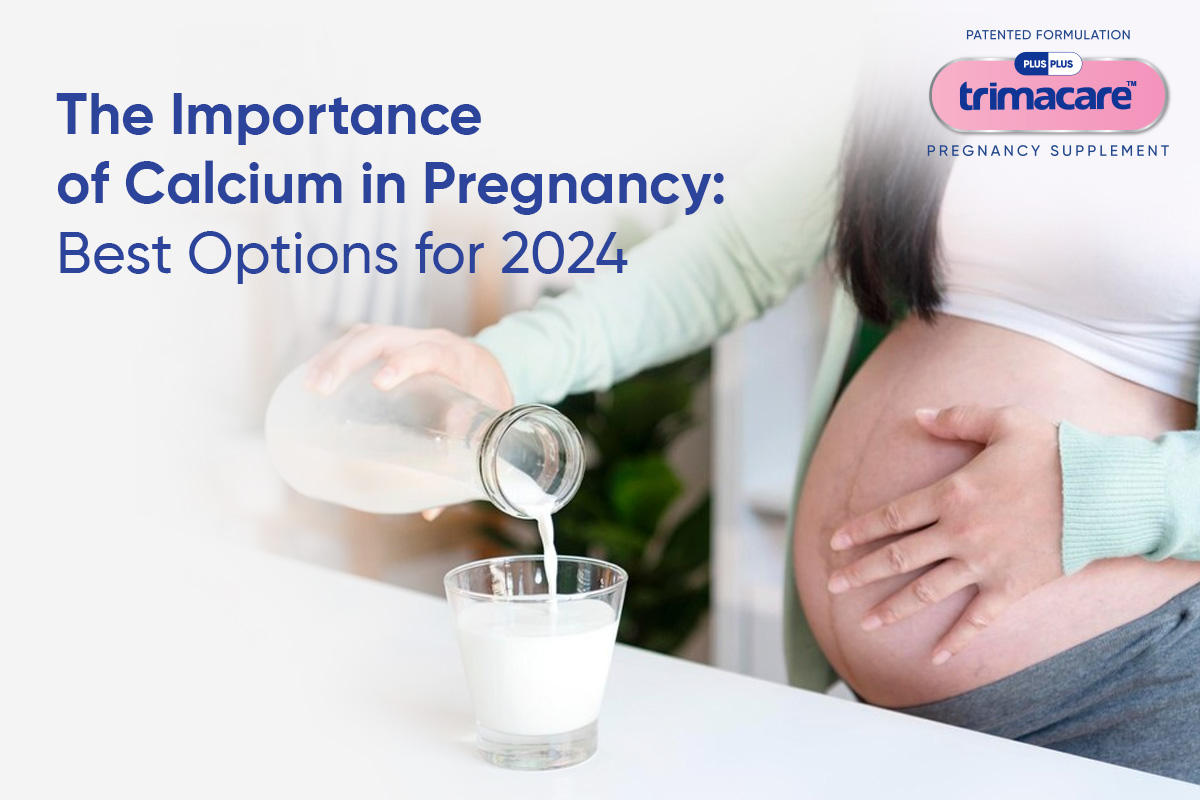
Pregnancy is an unforgettable journey that surprises you with new marvels every day, but it also comes with an increased nutritional need. Calcium is the crucial nutrient that supports both maternal and baby’s physical and mental health. It helps to develop healthy and strong bones and teeth, muscle function, nerve transmission, and cellular development. Furthermore, it also helps prevent pre-eclampsia and preterm birth and regulates blood pressure. Therefore, consuming adequate calcium during pregnancy is crucial for both the mother and the baby.
In this blog, we will learn the importance of calcium, the daily required amount, calcium-rich foods, and the best calcium for pregnancy.
Why Calcium is Important During Pregnancy?
Calcium is crucial for the mother and the baby’s development during pregnancy. Let’s learn why it is important:
- Bone and Teeth Development: Calcium helps develop healthy and strong bones and teeth of the baby. During pregnancy, the baby’s skeletal develops rapidly and calcium is required. If the mother doesn’t get much calcium in the diet, the calcium from the mother’s bone will be drawn, leading to weaker bone health for the mother.
- Nerve Function: Calcium plays a critical role in nerve signalling, an essential process for both the mother and the baby.
- Optimal Muscle Function: Calcium helps the muscles function properly including the heart muscles. During pregnancy, the heart works harder to pump more blood to support the baby’s growth.
- Regulate Blood Pressure: Calcium maintains blood pressure in pregnant mothers. Thus, prenatal supplements during pregnancy are recommended to lower the risk of developing high BP conditions that could be dangerous for both the mother and the baby.
- Healthy Pregnancy Outcomes: Calcium helps prevent pregnancy complications like preterm labour and birth. Studies have shown that women who consume calcium in pregnancy experience healthy pregnancy outcomes.
- Prevents Pre-eclampsia: This is a hypertensive disorder that leads to high blood pressure and protein in the urine. Some of the top contributors are low calcium consumption, twin pregnancy, obesity, diabetes, etc. Therefore, consuming calcium tablets during pregnancy is essential.
Calcium-Rich Foods
- Milk & Milk Products: Milk, yoghurt, cheese, and buttermilk
- Leafy Green Vegetables: Broccoli, collards (cabbage family), bok choy, Chinese cabbage, spinach
- Soy and Tofu: Tofu, tempeh, calcium-fortified soy drinks
- Fish: Sardines and canned salmon
- Nuts and Seeds: Brazil nuts, almonds, sesame seed paste
- Calcium-fortified Foods: Breakfast cereals, fruit juices, bread, plant-based milk
How Much Calcium Is Required Daily?
Calcium intake for women between 19 and 30 years old is 1000 mg daily, while women between 31 and 50 require 1200 mg daily.
When Consuming Calcium in Pregnancy Becomes Crucial?
Calcium is an essential nutrient during pregnancy for developing the baby’s bones, teeth, heart, and nervous system. The maternal body requires more calcium during pregnancy as the foetus draws calcium from the mother’s body in case of calcium deficiency. While there are several calcium-rich food items, including leafy green vegetables, dairy products, and fortified foods. However, some women struggle to require calcium from calcium-rich foods due to health conditions leading to a lack of calcium. Let’s learn who should consume calcium supplements during pregnancy:
- Women With Lactose Intolerance: Pregnant lactose-intolerant women need calcium tablets. These supplements help meet the Recommended Daily Allowance (RDA) of 1200 mg (for 31-50 years) or 1000 mg (for 19-30 years).
- Women With Health Disorders: Women with a history of osteoporosis or other bone health issues require calcium supplements. Additionally, women with poor diets or eating disorders are at a higher risk of insufficient calcium levels.
- Young Mothers or Teenagers: Pregnant teenagers or young mothers are still developing leading to increased calcium requirements. Thus, they need calcium tablets to support their growth with the baby’s.
- Multiple Pregnancies: Women carrying twins or triplets require extra calcium to support the well-being of multiple babies.
- Vegans or Vegetarians: Vegetarians or vegans often lack RDA of calcium as the staple Indian diet does not provide enough nutrients. Thus, consuming calcium supplements becomes crucial for supporting the optimal health of both the mother and the baby.
However, before starting any supplement, consult your doctors and follow their advice about the right dosage.
Why Trimacare™ is the Best Calcium for Pregnancy?
Trimacare™ is renowned as the best calcium supplement for pregnancy and is recommended by top medical experts. Formulated under the supervision of the best medical professionals, the supplement follows the WHO guidelines and ICMR. It contains 20+ essential nutrients, including calcium, iron, folate, Vitamins, etc., required during and after pregnancy. It is also rich in Omega-3 (EPA: DHA) (100% vegetarian and derived from deep-sea Algae), which helps the baby’s brain development.
Conclusion
Calcium is an essential nutrient that helps support the well-being of the mother and the baby during pregnancy. It helps prevent preterm birth and pre-eclampsia while supporting healthy bone and teeth development, regulating BP, nerve functioning, and healthy pregnancy outcomes. Several calcium-rich foods like milk products, green leafy vegetables, and fortified foods can help obtain calcium. However, the Indian diet lacks enough nutrients, thus, the requirement for the best calcium for pregnancy arises. Most doctors suggest Trimacare™ as the best calcium for pregnancy for optimal results.
FAQs
Why calcium is important during pregnancy?
Calcium is crucial for the baby’s bones, teeth, and nervous system development. It also helps support the muscles to function while maintaining the mother’s bone health.
How much calcium do I need daily?
Calcium intake for women between 19 and 30 years old requires 1000 mg of calcium daily, while women between 31 and 50 require 1200 mg of calcium daily.
What are the natural sources of calcium?
- Milk & Milk Products: Milk, yoghurt, cheese, and buttermilk
- Leafy Green Vegetables: Broccoli, collards (cabbage family), Chinese cabbage, spinach
- Soy and Tofu: Tofu, tempeh, calcium-fortified soy drinks
- Fish: Sardines and canned salmon
- Nuts and Seeds: Brazil nuts, almonds, sesame seed paste
- Calcium-fortified Foods: Breakfast cereals, fruit juices, bread, plant-based milk




